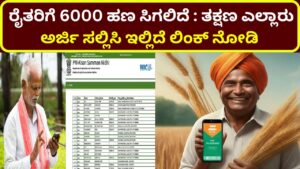Modi PM :ರೈತರಿಗೆ 6000 ಹಣ ಸಿಗಲಿದೆ : ತಕ್ಷಣ ಎಲ್ಲಾರು ಅರ್ಜಿ ಸಲ್ಲಿಸಿ ಇಲ್ಲಿದೆ ಲಿಂಕ್ ನೋಡಿ
PM-Kisan Samman Nidhi: An Overview
The Pradhan Mantri Kisan Samman Nidhi (PM-Kisan) is a central sector scheme of the Government of India aimed at providing financial assistance to the country’s small and marginal farmers. Launched in December 2018, the scheme is a significant step towards ensuring the economic security and well-being of the agricultural community in India. This initiative is expected to benefit millions of farmers and support the agricultural sector, which is a critical component of India’s economy.

Objectives and Scope
The scheme intends to enable farmers to have better crop production and productivity, thereby improving their overall income and ensuring a steady financial foundation.
The scope of PM-Kisan extends to all small and marginal farmers who own cultivable land. Initially, the scheme was meant for small and marginal farmers owning up to 2 hectares of land, but it was later expanded to include all farmer families, irrespective of the land size, to ensure a broader coverage and more inclusive support.
Financial Assistance and Disbursement
Under the PM-Kisan scheme, each eligible farmer family receives a financial benefit of Rs. 6,000 per year. Rs. 2,000 each, which are directly transferred into the bank accounts of the beneficiaries through the Direct Benefit Transfer (DBT) mode. This ensures transparency and minimizes the chances of fund diversion or corruption.
The payments are typically made in four-month intervals:
- April to July
- August to November
- December to March
These timely installments help farmers manage their expenses related to farming activities and household needs throughout the year.
Eligibility Criteria
To qualify for the PM-Kisan scheme, the following criteria must be met:
- The applicant must be a farmer family with cultivable land.
- The applicant’s name should appear in the land records of the respective state or Union Territory as on February 1, 2019, for inclusion in the scheme.
However, there are specific exclusions under the scheme:
- Institutional landholders.
- Farmer families holding constitutional posts.
- Serving or retired officers and employees of State/Central Government as well as Public Sector Undertakings (PSUs) and Government Autonomous bodies.
- Professionals like doctors, engineers, lawyers, Chartered Accountants, and architects who are registered with professional bodies and carry out their practices.
Implementation and Impact
The implementation of the PM-Kisan scheme involves a multi-tiered process:
- Identification of beneficiaries: The state governments identify and verify the eligible farmer families based on their land records and other documents.
- Enrolment: The beneficiaries are enrolled into the scheme through a dedicated online portal, where their details are uploaded.
- Verification: The data is verified through Aadhaar numbers to ensure authenticity and avoid duplicity.
- Disbursement: Once verified, the financial assistance is directly transferred to the bank accounts of the beneficiaries.
The impact of the PM-Kisan scheme has been substantial. It has provided a significant financial cushion to millions of farmers, enabling them to invest in necessary agricultural inputs like seeds, fertilizers, and equipment. This, in turn, has contributed to increased agricultural productivity and income stability among the farming community. Moreover, the direct cash transfers have helped in reducing the dependency of farmers on moneylenders and informal credit sources, which often come with high-interest rates and exploitative practices.
Challenges and Criticisms
Despite its positive impact, the PM-Kisan scheme has faced several challenges and criticisms:
- Identification and Exclusion Errors: There have been instances of eligible farmers being left out due to inaccuracies in land records or bureaucratic delays. Conversely, there have also been cases of ineligible beneficiaries receiving funds due to errors in verification processes.
- Technological Barriers: In some regions, especially in remote and rural areas, lack of access to technology and digital literacy has posed a challenge for farmers to enroll and receive benefits seamlessly.
- Delayed Payments: Delays in the disbursement of installments have occasionally been reported, affecting the timely support that farmers need.
- Political Interference: There have been accusations of political influence affecting the implementation and beneficiary selection process in certain areas.
Future Prospects
To address these challenges and enhance the effectiveness of the PM-Kisan scheme, several measures can be considered:
- Improving Land Records: Ensuring up-to-date and accurate land records can help in better identification and verification of beneficiaries.
- Enhanced Technological Infrastructure: Providing better digital infrastructure and training at the grassroots level can help farmers access the scheme more efficiently.
- Streamlining Processes: Simplifying the enrollment and verification processes can reduce delays and errors.
- Monitoring and Evaluation: Regular monitoring and third-party evaluations can help in identifying issues and improving the overall implementation of the scheme.
In conclusion, the PM-Kisan Samman Nidhi is a landmark initiative aimed at uplifting the economic status of farmers in India. While it has significantly contributed to the welfare of the agricultural community, continuous efforts to address the challenges and improve the implementation process are essential to maximize its benefits. The scheme represents a critical step towards ensuring the financial stability and growth of India’s agricultural sector, which is the backbone of the country’s economy.
